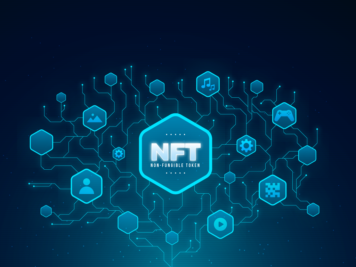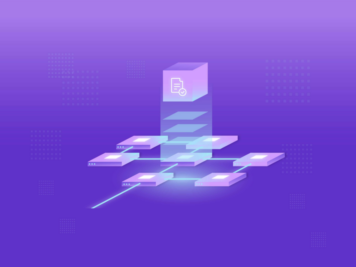Blockchain’s Blockchain’s permeation across industries has not only been swift but consequential. Gartner’s forecasts signal a future where blockchain technology could generate an astonishing $3.1 trillion in business value by 2030. By 2025, it’s predicted to account for $ 176 billion alone. These projections suggest that up to15% of global economic infrastructure could soon rely on blockchain-based systems, and it will become a competitive necessity rather than a niche experiment.
Use cases of blockchain do not limit themselves within cryptocurrency and bitcoin. They go beyond as their ability to offer transparency and fairness simultaneously by saving business time and money impact multiple sectors. From how contracts are enforced to making the government work efficiently, we have summed up some real-world blockchain use cases in the next section, check them out.
Industry-wise use cases of blockchain
Fintech
In the US and Europe around 90% of banks have adopted blockchain in one way or the other. Blockchain’s features like security, decentralization, clarity in transaction, and others are driving this uptake so much that the global FinTech blockchain market may reach $36.04bn by 2028. Top use cases of blockchain in the industry could help in better understanding of the sector’s growth.
- RTP Frameworks: With the US financial institutions putting more emphasis on real-time payments, adoption of blockchain is likely to increase.
- KYC: Blockchain’s transparency allows identity verification without disclosing the real identity. This, in turn, could improve the KYC procedure.
- Trading: Blockchain handles and improves the trading ecosystem with a generalized ledger where the flow of information is quick, as it gets refreshed in real-time.
- Digital identity: Blockchain allows the creation of digital identity persona instead of depending on the one created by banks. Users can transfer funds through digital avatars, share data, and perform other bank related activities.
Healthcare
Treatment within the golden hour is a concept that gets valued across the world in the emergency care sector. It calls for speeding up of various processes like early detection of disease, getting a hand on medical records, and others. Investors have started believing that blockchain could be an effective solution. This belief may help the global blockchain in healthcare market cross $1.18bn by 2028.
- Patient-centric electronic health records: In a blockchain-based system, medical records can be linked to an existing electronic medical record software with access to only the person with patient consent.
- Medical staff credential verification: Blockchain-based platform can provide faster access to credentials of medical and healthcare professionals and accelerate the hiring process with greater transparency.
- IoT security for remote monitoring: Blockchain, with its cryptography, could secure healthcare IoTs and prevent data leaks.
- Supply chain transparency: Leveraging blockchain based system to keep track of the items from the manufacturing point and at every single stage through the supply chain gives complete visibility and transparency of the goods to the customers.
Real Estate
Traditional forms of real estate transactions can soon become obsolete as these can be tokenized with blockchain smart contracts. Commercial enterprises and professionals have started recognizing how blockchain technology could impact retail and commercial property sales, streamline payments, and increase access to funds and investment opportunities.
- Property management: Blockchain enables secure data sharing, streamlines rental collections and payments to property owners, and offers premium due diligence across the portfolio thus increasing operational efficiency.
- Platform marketplaces: Blockchain platforms and marketplaces allow a more comprehensive real estate transaction where concerned parties can trade tokenized properties.
- Protection against fraud: Blockchain can ensure the removal of third parties who are likely to engage in fraudulent activities, dupe genuine buyers, and fast-track buying and selling properties.
- Cost affordability: By adopting blockchain, real estate enterprises could simplify the process of listing and selling, and curb costs.
Supply chain
The macroeconomy and global markets have supply chain as their foundation stone. To make it seamless, companies spend fortunes in finding inefficient areas. Blockchain could improve the scenario with its transparent systems and consequently, help the global blockchain in supply chain market reach $14.88bn by 2028.
- Supply chain finance: Blockchain could help with raising invoices by increasing system efficiency, transparency, and security, and ensuring quick payments.
- Supply chain planning: By removing intermediaries, easing verification of transactions and records, and helping in autonomous coordination, blockchain could boost supply chain efficiency.
- Food safety: Blockchain could simplify tracking and isolating food contamination and increase food safety.
- Finance management: Incorporating blockchain technology facilitates financial management. Users can access the financial records but cannot delete or alter the records.
EdTech
The EdTech industry got a massive boost from investors during the COVID-19 pandemic. Since then, the sector is getting challenged constantly by crises like latency, fraud, leak of personal data, and others. Blockchain can resolve these issues, so businesses are incorporating it into the mainframe.
- Student records: Blockchain is a perfect solution for storing, tracking, and using students’ credentials, which students and learners can use to share with employers.
- E-Transcripts: With blockchain’s distributed ledger technology, edtech institutions could streamline the transcript procedure and minimize fraudulent claims.
- Automated learning platforms: Smart contracts and IPFS could help with storing course-related content and its access and simplify the process of automating courses.
- Combating fraud in resumes & diplomas: Blockchain can be utilized as a forgery-proof record for the credentials listing of students with reliable background info. Educational institutes can save time on verifying credentials and simultaneously minimize fraud too.
Agriculture
Introduction of IoT and AI in the agriculture sector could benefit from blockchain’s security, speed, transparency, and trust. The technology could also improve food safety by ensuring traceability of the food chain supply. The global blockchain in the agriculture and food supply chain market may touch $0.94bn by 2025.
- Product activity control: Blockchain’s ability to track storage & transportation can be leveraged to sort out fruit and vegetable wastage.
- Fair pricing: Farmers can use integrated platforms with no intermediaries and more transparency to create an international trade union and increase their profit margin.
- Small farm insurance: Blockchain can localize the insurance industry for farmers to establish a centralized insurance market for crowdfunding and counter unfavorable conditions.
- Transparency: Blockchain in agriculture can assist in increasing transparency around the subsidies. Government authorities can leverage public blockchain to transact the subsidies to rightful farms and people can check where the money is going.
Insurance
The insurance sector is not immune to complexity, especially when it comes to fraud. According to a BCG survey, 60% of insurance companies are currently investing in blockchain technology with 80% of C-suite executives convinced that the technology will drive efficiency. Fraudulent claims, excessive operating expenses, and administrative fees disproportionate to risks continue to plague the industry. Here’s how blockchain technology could provide solutions:
- Authenticity: A decentralized system bolstered by blockchain can instill greater trust in verifying identities.
- Cost savings: By automating processes and cutting out intermediaries, blockchain can reduce operational costs.
- Transparency: Blockchain’s transparency makes it easier to track claims and identify fraud, leading to fairer, more accurate payouts for genuine claims.
- Smart contracts: With the use of smart contracts, insurance policies can be automatically executed based on predefined conditions. This eliminates the need for manual processes and reduces the potential for human error.
Energy
The energy sector, plagued by inefficiency, high prices and opacity, is ripe for change. Blockchain technology, with its promise of decentralization and transparency, has the potential to transform the sector, reducing transaction costs by up to 40%. Its applications are transformative. Here’s how:
- Peer-to-Peer Energy Trading: Blockchain facilitates direct energy trading among individuals and businesses, reducing reliance on intermediaries and enhancing renewable energy use.
- Supply Chain Management: With blockchain’s immutable ledger system, tracking and managing the supply chain becomes easier and more transparent. This can help in reducing operational costs for companies.
- Smart Grids: Integrating blockchain with smart grids can help optimize energy use, reduce waste, and promote the use of renewable energy. This can result in a more sustainable and efficient energy system.
- Decentralized Energy Platforms: Blockchain, by decentralizing energy systems, can provide people and communities around the world with greater access to clean, affordable energy. This can also result in a more equitable allocation of resources.
Entertainment
The entertainment sector focuses on delivering better experiences to its audiences. This is why the industry constantly integrates the latest technologies. Blockchain has grabbed eyeballs and is witnessing a steep uptake as it can revolutionize the way entertainment material is generated, distributed, and sold. Market reports are favorable. The blockchain industry for media, advertising, and entertainment can cross $27.29 billion in 2029
- Content Ownership: Artists and producers can gain greater control over their content with blockchain by keeping it on a decentralized ledger. This can also help prevent illegal use of copyrighted material.
- Royalty transparency: Blockchain technology can automate royalty payments for artists, cutting out middlemen and ensuring fair and transparent revenue distribution.
- Secure Ticketing: Using blockchain for tickets can help eliminate fraud and ticket reselling, ensuring only legitimate fans can attend events.
- Fan Engagement: Blockchain technology can help artists to communicate directly with their fans through digital tokens or prizes, resulting in more personalized and engaging experiences.
Public sector
Governments around the world are evaluating blockchain to improve services and increase transparency. Guinea-Bissau, a small African country, has adopted blockchain recently to promote transparency in its public sector wage bill. The Philippines have also shown interest in adopting eGOVchain to deliver secure and efficient public services.
- Digital Identity: Blockchain technology can offer citizens a secure and tamper-proof digital ID, thereby addressing concerns about fraud and duplicate identities.
- Voting Systems: By using blockchain, governments can ensure transparent and tamper-proof voting systems, increasing trust and participation among citizens.
- Land Registry: Blockchain’s immutable ledger technology can help create a more efficient and transparent land registration system, decreasing ownership conflicts.
- Tax Collection: Using blockchain for tax collection can reduce administrative overhead and promote transparency in the tax system, ensuring that all individuals and businesses contribute fairly.
Advertising
Blockchain could be the perfect solution for trust-related issues that disrupt digital advertising. The technology, with its decentralized and transparent framework, can add layers of security and even host smart contracts to manage and automate transactions. However, regulatory challenges could pose as obstacles to easy integration of blockchain.
- Decentralization: By decentralizing the advertising process, blockchain can eliminate middlemen and reduce advertising costs.
- Transparency: Blockchain technology offers a transparent way to track and verify advertising impressions and clicks, preventing fraud and ensuring accurate reporting.
- Targeted Advertising: Consumers can have more control over their data by using blockchain and selecting only relevant and targeted ads. This benefits both marketers and consumers as it increases the ROI of ads and also improves user experience.
- Micropayments: Blockchain technology can enable microtransactions for online content, opening up new revenue streams for content producers and publishers. This eliminates the need for third-party advertising systems, allowing content providers to have greater control.
Data management
Existing data management solutions often lack security and transparency. The growing number of data breaches, notably the Equifax incident in 2017, has raised serious concerns about the misuse of personal data. While encryption methods can help mitigate risks, they do not provide complete protection.
Blockchain technology can solve the problem by creating decentralized and immutable databases. This means that data is distributed across multiple nodes, making it difficult for hackers to access and modify it. Furthermore, the immutability of the blockchain means that data cannot be modified once recorded, providing a high level of security and transparency.
- Secure Data Storage: Using blockchain technology, sensitive data can be securely held on a decentralized network, reducing the risk of data breaches.
- Data Sharing: Blockchain technology enables the secure and transparent flow of data between individuals or organizations, without the need for intermediaries.
- Monetizing Data: Individuals can use blockchain technology to monetize their personal data by selling it directly to interested parties, rather than allowing companies to collect and sell it without their knowledge or consent.
- Data Marketplaces: Blockchain technology can help create decentralized data markets where buyers and sellers can exchange data in a secure and transparent environment. This could result in a more efficient and equitable data market.
Social media
Social media has challenges such as data privacy, censorship, and lack of user control. Blockchain technology can address these issues, resulting in a more decentralized and user-controlled social media experience.
- Data Privacy: Blockchain technology can increase social media privacy by decentralizing data storage and allowing consumers to have more control over their data.
- Censorship Resistance: Blockchain technology enables the creation of decentralized social media platforms that are not filtered or controlled by a central authority.
- User Rewards: With blockchain, users can earn rewards for creating and sharing content on social media platforms, incentivizing high-quality content and engagement.
- Verification: Blockchain can be used to verify the authenticity of user accounts and prevent the creation of bots or fake profiles, improving the overall credibility of social media platforms.
Conclusion
With blockchain impacting multiple industries and transforming them rapidly, these are some of the top blockchain use cases across various industries that have been explained extensively here. Before implementing blockchain in your industry, you should check out our blog on blockchain implementation This blog will surely help you to have better clarity and make the right decision.
FAQs
What are the environmental implications of blockchain use cases?
While blockchain has several advantages, it is critical to assess its environmental impact, particularly its energy consumption. Some blockchain systems, such as Bitcoin, employ proof-of-work mechanisms, which are energy-intensive due to their reliance on complex calculations. However, newer systems are considering less energy-intensive options, such as proof-of-stake.
How can blockchain be used in supply chain management beyond transparency and tracking?
In addition to transparency and tracking, blockchain in supply chain management can improve product authenticity, prevent counterfeiting, and streamline operations by facilitating stakeholder collaboration through smart contracts.
What are the potential use cases of blockchain in healthcare?
Blockchain in healthcare can help protect patient data, simplify claims processing, and maintain the integrity of clinical studies by providing a tamper-proof audit trail. It can also help in more efficient transfer of healthcare records between providers.
Can blockchain technology help reduce operational costs?
Yes, blockchain technology can dramatically reduce operational costs by automating operations such as executing contracts using smart contracts, reducing paperwork, and lowering transaction fees by eliminating middlemen.
What role does blockchain technology play in improving cybersecurity?
Blockchain technology improves cybersecurity by using a decentralized and immutable ledger to protect data from tampering and illegal access. Its cryptographic principles ensure that only authorized users can add information to the network, making it a robust tool to combat cyberattacks.









